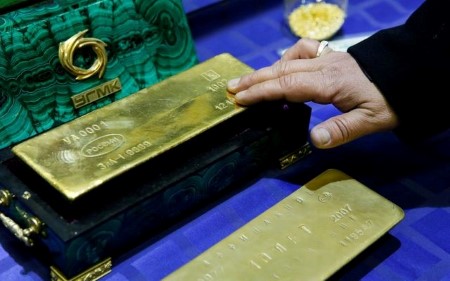




January Economic Update: Growth slows, prices rise
 DOWNLOAD
DOWNLOAD

Inflation Update: Up, up, and away?
 DOWNLOAD
DOWNLOAD

Quarterly Economic Growth Release: Growth takes on a slower pace
 DOWNLOAD
DOWNLOAD


Stronger dollar pushes gold to fifth weekly loss

July 15 (Reuters) – Gold slipped on Friday and was headed for a fifth consecutive weekly loss, knocked down by the dollar’s overall strength amid prospects of steep rate hikes by the US Federal Reserve.
Spot gold fell 0.3% to USD 1,704.30 per ounce by 1750 GMT, and has lost around 2.2% so far this week. US gold futures settled down 0.1% at USD 1,703.6.
“Prices have been pressured by a very strong dollar. The market, from being worried about inflation, has turned to being worried about recession, resulting in lower demand across metals, including gold,” said Jim Wyckoff, senior analyst at Kitco Metals.
The dollar eased, but held near a two-decade high, denting gold’s appeal among overseas investors and also gobbling up safe-haven flows amid slowdown fears.
“With gold bugs falling like dominoes, prices are now challenging pre-pandemic levels, raising risks that the largest speculative cohort in gold will start to feel the pain under a hawkish Fed regime,” TD Securities said in a note.
Gold is considered an inflation hedge, but rate hikes raise the opportunity cost of holding non-yielding bullion.
Meanwhile, US retail sales rebounded strongly in June as Americans spent more amid soaring inflation, which could allay fears of an imminent recession but not change the view that growth in the second quarter was tepid.
Investors also took stock of the EU’s potential plan to adopt its seventh package of sanctions against Russia that would add a ban on Russian gold imports.
“The EU sanctions will not have a big impact on supply and demand as Russia can just sell their gold to other countries, gold is pretty fungible,” Wycoff added.
In the physical gold market, recent price decline drew some buyers in Asian hubs.
Silver was up 1.5% at USD 18.65 per ounce, but was headed for a weekly decline.
Platinum was steady at USD 843.90, while palladium fell 2.8% to USD 1,843.69, seeing its first weekly decline in four weeks.
(Reporting by Ashitha Shivaprasad and Arundhati Sarkar in Bengaluru; Editing by Anil D’Silva and Shailesh Kuber)
This article originally appeared on reuters.com





 By Reuters
By Reuters